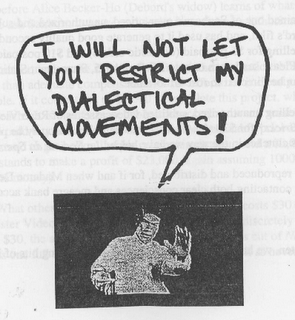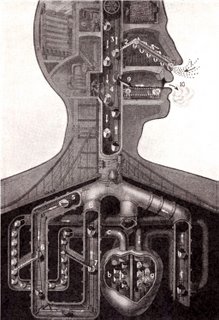There are so many other things that I should be writing now, but a post (or two) on dialectics necessitates a post on "bad infinities" so here goes.
Have you ever seen a commercial for Pizza Hut (or Dominos for that matter) that advertises some new twist on pizza? Something like "new stuffed crust," "double layer,"or some other needless improvement on a basic formula that really does not need improving. If they are not advertising some variation on pizza then they are advertising some kind of breadstick, or something that you can dip into somekind of sauce. No sooner are these things introduced then they disappear. Well why do they do this? It could just be that "Constant revolutionizing of production, uninterrupted disturbance of all social conditions, everlasting uncertainty and agitation distinguish the bourgeois epoch from all earlier ones. "
I think that there might be a little more to it than that. First of all pizza is generally pretty popular, so it is a bit hard to imagine that there are potential consumers out there who are saying themselves "I would try that Pizza-thing if only the crust were stuffed somehow." So it is not an attempt to expand the market. At the same time pizza is so popular that every town has its little mom and pop places, regional chains, etc., which are generally more popular than the major chains. So I can only think that all of these "innovations" are an attempt to move the pizza commodity from formal to real subsumption, to get it so pizza exists as something that only a major corporation can deliver. The stuffed crusts, dipping sauces, and other innovations are an attempt to beat the petit bourgeois purveyors of pizza through superior technology (I imagine stuffing crust involves some kind of compressed air gun or some other device not found in your average pizza parlor). To bring it up to speed with the rest of the staples of American fast food, which are primarily consumed in their name-brand variations.
Have you ever seen a commercial for Pizza Hut (or Dominos for that matter) that advertises some new twist on pizza? Something like "new stuffed crust," "double layer,"or some other needless improvement on a basic formula that really does not need improving. If they are not advertising some variation on pizza then they are advertising some kind of breadstick, or something that you can dip into somekind of sauce. No sooner are these things introduced then they disappear. Well why do they do this? It could just be that "Constant revolutionizing of production, uninterrupted disturbance of all social conditions, everlasting uncertainty and agitation distinguish the bourgeois epoch from all earlier ones. "
I think that there might be a little more to it than that. First of all pizza is generally pretty popular, so it is a bit hard to imagine that there are potential consumers out there who are saying themselves "I would try that Pizza-thing if only the crust were stuffed somehow." So it is not an attempt to expand the market. At the same time pizza is so popular that every town has its little mom and pop places, regional chains, etc., which are generally more popular than the major chains. So I can only think that all of these "innovations" are an attempt to move the pizza commodity from formal to real subsumption, to get it so pizza exists as something that only a major corporation can deliver. The stuffed crusts, dipping sauces, and other innovations are an attempt to beat the petit bourgeois purveyors of pizza through superior technology (I imagine stuffing crust involves some kind of compressed air gun or some other device not found in your average pizza parlor). To bring it up to speed with the rest of the staples of American fast food, which are primarily consumed in their name-brand variations.






